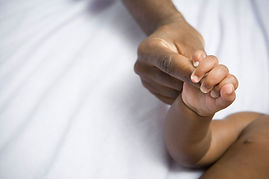
Becoming a parent is often heralded as a joyful and life-changing experience, but it's essential to recognize that the journey into parenthood can also be riddled with challenges and emotional hurdles. While postpartum depression (PPD) in mothers has gained more attention in recent years, the experience of fathers grappling with postpartum depression remains largely unexplored and stigmatized.
Postpartum depression, often referred to as "baby blues," is a form of clinical depression that affects parents following the birth of a child. Contrary to popular belief, fathers can also experience this condition. While the prevalence of PPD in fathers may be lower than in mothers, it's a significant issue that requires attention.
Causes and Risk Factors

Several factors contribute to the development of postpartum depression in fathers:
1. Hormonal Changes: Just as mothers experience hormonal shifts after childbirth, fathers can also experience hormonal changes that might impact their mood and mental well-being.
2. Sleep Deprivation: The sleep disruptions that come with caring for a newborn can affect fathers' sleep patterns, leading to mood disturbances.
3. Emotional Adjustment: The transition to parenthood brings significant emotional changes and challenges, which can trigger anxiety and depression in fathers.
4. Relationship Dynamics: Changes in relationship dynamics and increased stress can contribute to feelings of isolation, depression, and anxiety.
5. Personal History: Fathers with a history of depression, anxiety, or other mental health conditions may be more susceptible to PPD.
6. Financial Stress: The financial responsibilities of parenthood can cause stress and anxiety in fathers, exacerbating the risk of postpartum depression.
Signs and Symptoms

Recognizing the signs of postpartum depression in fathers is crucial for early intervention. Some common symptoms include:
1. Persistent Sadness or Irritability: Fathers experiencing PPD might exhibit unexplained mood swings, anger, or irritability.
2. Loss of Interest: A lack of interest in activities once enjoyed can indicate the presence of depression.
3. Fatigue and Sleep Disturbances: Sleep difficulties and chronic fatigue are classic symptoms of depression.
4. Withdrawal from Social Interactions: Fathers might isolate themselves from friends and family due to feelings of shame or inadequacy.
5. Physical Symptoms: PPD can manifest physically, with symptoms like headaches, digestive issues, and body aches.
6. Changes in Appetite: Significant changes in appetite, whether increased or decreased, can be indicative of PPD.
Impact on Fathers and Families

The effects of postpartum depression in fathers extend beyond the individual, impacting the family dynamic and the child's development:
1. Parent-Child Bonding: PPD can hinder the formation of a strong bond between fathers and their newborns.
2. Relationship Strain: The stress of PPD can strain relationships, leading to conflicts and misunderstandings.
3. Child Development: Children of fathers with untreated PPD might face emotional and cognitive challenges later in life.
4. Self-Care and Coping: Fathers' ability to engage in effective self-care can be compromised by the symptoms of PPD.
Breaking the Stigma: Encouraging Open Conversations
The stigma surrounding mental health issues, including PPD in fathers, can prevent individuals from seeking help. By fostering open conversations about postpartum depression, society can break down these barriers and offer support:
1. Normalizing Fathers' Vulnerability: Encourage fathers to embrace their vulnerability and express their emotions without fear of judgment.
2. Supportive Partnerships: Partners play a pivotal role in recognizing the signs of PPD and providing emotional support.
3. Healthcare Providers' Role: Healthcare professionals should screen fathers for PPD during postpartum check-ups and provide appropriate resources.
4. Peer Support Groups: Creating safe spaces where fathers can share their experiences can help alleviate the sense of isolation.
Seeking Help and Treatment

Acknowledging postpartum depression is the first step, followed by seeking help and treatment. Fathers should consider:
1. Therapy: Individual therapy sessions or couples therapy can help fathers manage their emotions and improve communication within their family.
2. Medication: In some cases, medication might be prescribed to alleviate the symptoms of PPD.
3. Healthy Lifestyle: Regular exercise, a balanced diet, and adequate sleep can significantly impact mental well-being.
4. Social Support: Engaging in activities with friends and family can provide a support system that helps combat feelings of isolation.
The silent struggle of postpartum depression in fathers highlights the need for increased awareness, understanding, and support. By acknowledging that fathers can also experience PPD, society can foster open conversations that promote mental well-being, strengthen familial bonds, and contribute to healthier parent-child relationships. Breaking down the stigma surrounding PPD in fathers is an essential step toward building a more inclusive and compassionate approach to parenthood.


Comments